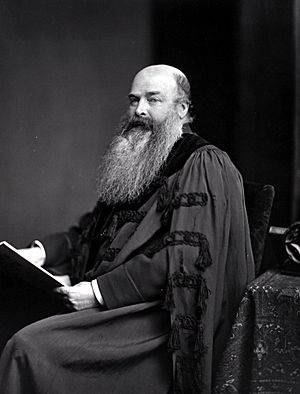Thomas Anderson (chemist) facts for kids
Quick facts for kids
Thomas Anderson
|
|
|---|---|
 |
|
| Born | 2 July 1819 |
| Died | 2 November 1874 (aged 55) Chiswick, England
|
| Alma mater | University of Edinburgh |
| Awards | Royal Medal (1872) Keith Medal (1853-55) |
| Scientific career | |
| Fields | chemistry |
| Institutions | University of Glasgow |
Thomas Anderson (born July 2, 1819 – died November 2, 1874) was an important Scottish chemist from the 1800s. He made big discoveries in chemistry. For example, in 1853, he figured out the correct chemical recipe for codeine. Codeine is a medicine used to help with pain.
Later, in 1868, he found a new chemical called pyridine. He also found other similar chemicals. He discovered these by studying oils from animal bones. Besides his work on these chemicals, Anderson also helped a lot with agricultural chemistry. This is the study of chemistry related to farming. He wrote many reports about soils, fertilizers, and plant diseases. He also advised his friend, Joseph Lister, about using carbolic acid as an antiseptic. Antiseptics are chemicals that kill germs and stop infections.
Contents
Thomas Anderson's Life and Work
Thomas Anderson was born in Leith, Scotland. He studied medicine at the University of Edinburgh. He earned his medical degree in 1841. While studying medicine, he became very interested in chemistry.
Studying Chemistry in Europe
After finishing his medical studies, Anderson spent several years in Europe. He studied chemistry with famous scientists. He learned from Jöns Jakob Berzelius in Sweden. He also studied with Justus von Liebig in Germany. These experiences helped him become a great chemist.
A Career in Chemistry
When he returned to Edinburgh, he worked at the University of Edinburgh. He also worked for the Highland and Agricultural Society of Scotland. In 1852, he became a professor of chemistry. This was at the University of Glasgow. He stayed in this important job for the rest of his career.
In 1854, he also became an editor for a science magazine. It was called the Edinburgh New Philosophical Journal. This showed how respected he was in the science world.
Awards and Later Life
In 1872, Anderson received a special award. It was the Royal Medal from the Royal Society. He earned this award for his many important discoveries. These included his work on codeine and pyridine. He also got it for his research in how chemicals work in living things.
Thomas Anderson stopped working in early 1874. He passed away later that year in Chiswick, England. Another chemist named John Ferguson took over his teaching position.

